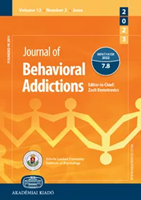Driving and mobile phone use: Work addiction predicts hazardous but not excessive mobile phone use in a longitudinal study of young adults
Driving and mobile phone use: Work addiction predicts hazardous but not excessive mobile phone use in a longitudinal study of young adults
Author(s): Bernadette Kun, Borbála Paksi, Andrea Eisinger, Gyöngyi Kökönyei, Zsolt DemetrovicsSubject(s): Media studies, Social psychology and group interaction, Behaviorism, Substance abuse and addiction, Social Informatics
Published by: Akadémiai Kiadó
Keywords: work addiction; problematic mobile phone use; driving; anxiety; worry; rumination;
Summary/Abstract: Background and objectives: Work addiction (WA), characterized by dimensions such as overcommitment, difficulties in detachment from work, and work-life imbalance, is presumed to be associated with increased smartphone usage, even during risky activities like driving. The study investigated the connection between WA and future problematic and hazardous smartphone use, considering personality factors: anxiety, rumination, and worry. Methods: A three-wave longitudinal study (N 5 1,866) was conducted from March to July 2019, June to September 2020, and June to November 2021, involving a representative sample of 18-34-year-old residents in Hungary’s capital. The study employed Hungarian versions of the Bergen Work Addiction Scale, Problematic Mobile Phone Use Questionnaire, Ruminative Response Scale, Anxiety subscale of the Brief Symptom Inventory 18, and Penn-State Worry Questionnaire. Additionally, author-developed questions on mobile phone use while driving were included. Results: At baseline, those at risk for WA showed more frequent mobile phone use while driving at both time points 2 and 3 compared to the non-risk group. Path analyses revealed rumination, anxiety at time 1, and worry at time 2 as significant mediators between baseline WA and mobile phone use while driving at time 3. However, when analyzing all three mediators together, only anxiety at time 1 and worry at time 2 remained significant. Discussion and conclusion: This study demonstrates that WA predicts future mobile phone use while driving through mediation by anxiety and worry. Our findings add to the growing evidence highlighting the detrimental aspects of WA, emphasizing the need for improved prevention and treatment strategies.
Journal: Journal of Behavioral Addictions
- Issue Year: 13/2024
- Issue No: 1
- Page Range: 66-75
- Page Count: 10
- Language: English

